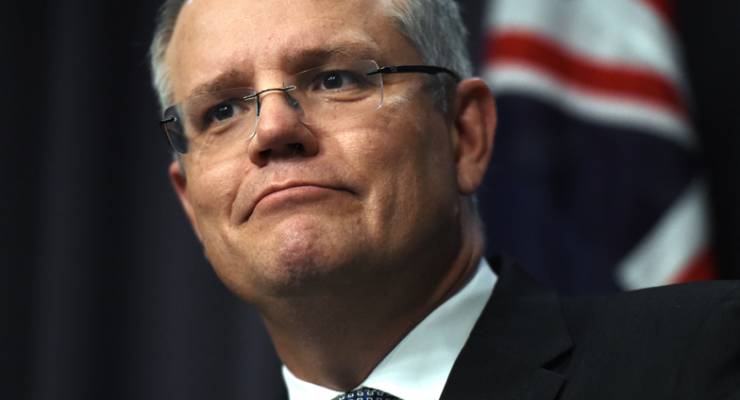
The Treasurer’s new entry in the lexicon of dodgy political rhetoric this week has some application beyond the welfare v wealthy, lifters v leaners rhetoric it was intended to evoke. Some corporations are in danger of becoming taxed-nots as well.
First there was Wesfarmers and its lake of red ink revealed this week, then yesterday Woolworths confirmed its first loss as a public company. Together, our two biggest retailers managed $5.5 billion in losses, thanks to impairments, write-offs restructuring costs and other charges, all in 2015-16 alone.
It’s bad news for superannuation investors — the retailers are among the most widely held shares across the corporate, retail, industry and SMSF sectors. This week’s losses, and the broader performance of the retailers, have damaged the financial wellbeing of millions of Australians through their superannuation holdings. Woolies’ share price has fallen from more than $37 a share to low of $20.20 (the shares closed just over $25 each yesterday) while Wesfarmers shares closed at $43.66 yesterday and have gone nowhere since March, 2013, when they were around $41 to $43 each.
Then there was the cut in dividend: Wesfarmers trimmed its 2015-16 payout to shareholders (and your super funds) from $2 a share to $1.86, a drop of 7%. Woolies slashed its payout by 44% — to 77 cents a share from $1.39 in 2014-15. That’s bad news for the Scott Morrison — even though corporate dividends are mostly higher this year, Woolies and Wesfarmers have large shareholding bases, so small investors in particular will have smaller tax bills from their holding in these companies, not to mention the companies’ own lower tax payments to the ATO. The fall won’t be like BHP’s US$2.7 billion fall a fortnight ago, but it will be noticeable nevertheless: Wesfarmers tax bill fell from $1.033 billion in 2014-15 to $311 million in 2015-16; Woolies’ from $995 million to $519 million. Together the two giant retailers will direct $1.198 billion to the ATO for 2015-16, against $2.028 billion the year before. And by the way, BHP also slashed its dividend by more than 70% to 30 US cents a share from US$1.29 a year earlier.
These multibillion-dollar losses in Australia and the ensuing impacts on tax revenue all came through managerial decisions — BHP for paying way too much for gas assets in the US and overcapitalising investment in other areas such as nickel; Wesfarmers stuffed up at Target, but it also got caught by the downturn in coal; Woolies generated all its $3.2 billion-plus of losses and the fall in the share price and tax payments to Canberra through its badly managed and, in the end, stupidly expensive hardware adventure. A decade ago, people were wondering if Coles was ever going to catch up to market leader Woolworths. This week, the only meaningful lead Woolworths has is in losses.
At least Morrison acknowledged this week that he had an “earnings” problem. That problem has gotten worse by several billion dollars in the last two weeks, and it’s nothing to do with low-income earners spongeing off welfare and not paying tax.







“BHP for paying way too much for gas assets ”
Is that not the usual sign of a market top: BHP and Telstra making large purchases?
Why don’t we hear more from the media that the ordinary people in the community read and watch on our TV and in our papers.
You have to be a member of Crikey to get this information. It needs to be very public especially the part that it is the loss of revenue from the big corporations and not from the monies that the ordinary person receives from the government. Yes a lot is but we need to hear the facts.
“Earnings problem” – from a “Cargo Cult/Limited News Party” government treasure?
This “rose thorn” was a member of the party, that (over a decade, in a quest to curry electoral favor – under Howard and Costello) raised middle-class welfare and tax cuts (emasculating investment/revenue) to an art form? …. Not to mention “$Iraq” and other accoutrements?
I just hope the less well-off are ready for his “Castor Oil Tax” – because, if form’s any guide, it’s unlikely his sponsors are going to be getting it where it hurts?
Why do all these terribly clever people at the top who stuff up so badly get paid so much? Why do shareholders keep approving their pay packets?
I would not be happy if I was reliant on dividends for my income, but I understand that high dividends and expectation of is a lot of our problem with the lack of growth in business, as money is not being returned to grow businesses while it is being expended in dividends.
@bushby Jane, years ago The Independent Monthly showed that around the world and particularly in Australia Company Directors with few exceptions had a level of renumeration inversely proportional to the company’s Return on Capital. The more lousy they performed, the more they got paid.
The reason this keeps happening is that the in-club of funds managers and corporate investors hold the majority of shares in the majority of Australian companies. To fix this, super funds should be required to allow investors to exercise the votes of their share of invested funds at AGMs. The way it stands, the in group can just keep reelecting, promoting and hyper-paying each other.
I don’t think we’ll return to sustainable profits until, well, business becomes sustainable. That means renewable energy, recycled materials, repairable systems.